Brexit: The economic impact a year on

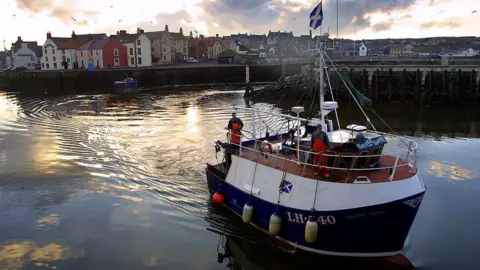 Getty Images
Getty Images- Twelve months since the trade deal with which Britain left the European Union, what impact has it had on the economy? Covid makes it impossible to be sure, but it's much harder to spot Brexit benefits than costs.
- Some of the effect will not be clearer until import customs are applied. Some larger companies have adapted. But haulage and hotels are short staffed. And for small food exporters, the paperwork and the costs have been mounting up.
- The true economic impact could take many years to see. Meanwhile, many companies will wait for the UK to resolve its internal differences about the direction of Brexit.
Christmas Eve 2020 was a busy one for those of us with the task of digesting the Brexit exit deal agreed that day by Boris Johnson and his chief Brexit negotiator, Lord Frost.
A year on, we're still trying to find out what impact it will have. We may have a long wait.
As Mao Zedong is often quoted as saying, when asked in the 1970s what he thought of the French Revolution: it's too early to judge. But it's been an interesting start.
Think back to that time. Britain was already out of the European Union, but not of the single market and customs union. It was days away from "crashing out" with no agreement on trading arrangements, which seemed likely to lead to dire economic consequences.
Kent was being prepared for a vast backlog of trucks, while exporters and importers were facing a meltdown in cross-Channel trade and supply chains.
To square the circle on the Northern Irish peace process, the deal required the UK to accept what we were told no Prime Minister could ever accept - a trading boundary between the British mainland and Northern Ireland.
It's unclear if Boris Johnson understood the deal he signed, or at least its consequences. Or perhaps he did, and reckoned he could later repudiate the bits he didn't like, and blame Brussels.
Trying to make that boundary work between Cairnryan and Larne has eaten up a lot of 2021 and of goodwill between UK and EU, when the latter was already in short supply.
It's still not resolved, and Lord Frost has just exited his Brexit role, citing disappointment at the way Brexit is going, as well as disapproval of Covid's constraints on individual liberties.
His role has passed to Liz Truss, the Foreign Secretary, who didn't hold back in her critique of Brexit back in 2016. She has since embraced it. To reassure Tory hardliners on Brexit, one of their own is her number two.
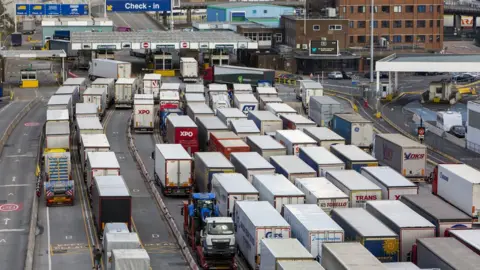 Getty Images
Getty ImagesThat means the politics and process of Brexit is a balancing act within Whitehall, while businesses, farmers, universities, travellers and numerous other groups have continued to adjust to life outside Europe's single market and customs union.
Tight labour
I went back to some of those most affected, to find out how things look a year on.
At the Crieff Hydro family-owned family of 11 hotels, proprietor Stephen Leckie says no-one in the industry realised it would be "this bad".
He says the tone of Brexit has discouraged European visitors from visiting, but the direct impact is in staffing.
Covid has taken away a large chunk of his custom; pre-Christmas group bookings were down by more than half on the normal level before Omicron hit, and now they're down to below a quarter.
But even if he could attract the custom, he doesn't have the staff.
Of 20 food outlets in his group, half are shut or operating well below capacity because of staff shortages. In recent months, one in six jobs has been vacant.
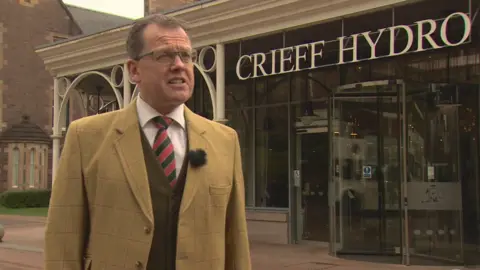
There aren't enough housekeeping workers, so the hotel chain has had to constrain capacity to 70% of rooms during the week, and 85% at weekends. Those still on the payroll are complaining of having to work flat out with overtime and extra days.
A Berlin-born food and beverage manager, Stefanie Phillips, explained that some EU nationals left Scotland for home, as they always have, though many departed earlier than planned because of Covid lockdowns.
Others applied for settled status, expecting to return, but with Covid and job opportunities elsewhere, they've stayed away. Some applied to work in the UK, to find they have no work status.
So how about recruiting elsewhere? A few Indians are joining, but work visas for Indians or Europeans cost £6,000, when Crieff is allowed one. They can only be for managerial posts. More junior posts are being filled by Strathearn teenagers, when they're not at school.
A key part of the Brexit pitch was that British people would get the jobs instead of Europeans. So how's that going? Ms Phillips says the current tight labour market sees people leave quickly if they see something with higher pay or working hours that suit them better.
Blame game
Among small firms looking to source materials from the EU, getting hold of supplies has been disrupted by red tape.
EU-based suppliers to the UK, with no previous exports outside Europe, now have to fill in consignment forms that they're unused to, and some choose not to bother.
It seems that some have used Brexit as an excuse to crank up prices. But that also reflects supply chain disruption around the world, including sea-going freight and sky-high air cargo prices. It's rarely, if ever, easy to separate out these factors from Brexit.
Economic modellers at the Centre for European Reform have given it a try, though.
They compare the UK as it is with a doppelgänger UK, following the attributes of EU economies that were most similar before Brexit and before Covid.
Isolating the Brexit effect suggests a drop of 11 to 16% in the amount of UK trade, which in October came to 15.7% on imports and exports, worth £12.6bn.
Food faces the most new rules outside the EU. Importers of food into the UK have not yet been hit by delays and red tape at UK customs, because implementation of the rules has been delayed, and then delayed again.
Whitehall is wary: there could be a blame game if imported fresh fruit and veg prices soar, along with French cheese, Italian olive oil and pasta, and Irish dairy and beef.
Scottish exporters of food have been among the firms most affected so far. They have found Brexit has been good for generating paperwork where none previously existed.
The larger firms, which export by the truckload, are getting used to the form-filling. Inconsistent application of the rules by inexperienced EU customs officers are less of a problem than earlier this year.
So farmed salmon, for instance, has recovered from a very rocky few weeks last winter, when seafood was the first to encounter disruption at Channel ports. Others had stockpiled and were waiting to see what happened. Fresh seafood cannot wait, so that put Scottish exporters into the Brexit frontline.
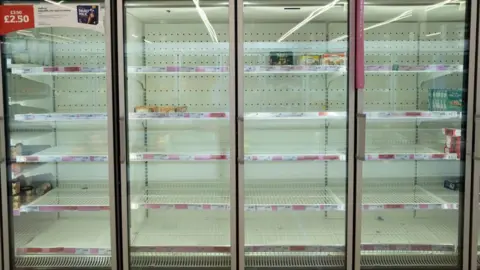 Getty Images
Getty ImagesSalmon is getting through, but it often takes longer, and if it misses market deadlines and has shorter shelf-life, it is worth less. Scottish salmon prices have lost some of their premium. As much of Scottish aquaculture is owned in Norway and the Faroes, these companies are happy to supply from elsewhere.
Lobster and langoustine
It is the smaller companies that have found it toughest. MacDuff Beef, a family firm with its butcher business in Lanarkshire, used to export prize cuts to the most discerning of continental butchers and restaurants. It was as easy to sell into Europe as to any customer in the UK.
But it only ever sent small consignments. MacDuff is not on a scale to fill a truck. The company's boss, Andrew Duff, says hauliers are not willing to risk multiple pallets of meat from different exporters, when each one has to have separate paperwork, and they move at the pace of the least well-prepared.
So MacDuff has simply given up exporting to the European Union, and sees no prospect of returning. Instead, Andrew Duff has turned his attention to retail, opening a counter in Edinburgh's new St James Quarter.
That's created three jobs. And you can find jobs being created elsewhere, some of them as European firms feel the need to have a UK presence.
At Angelbond shellfish wholesaler in Glasgow, manager Ronald Scordia has taken on another worker to handle the paperwork involved in sending langoustine and lobster to the market in Boulogne-sur-Mer.
He has cut down the number of consignments from daily to three or four per week.
He needs to be licensed for export, and each consignment needs a permit to be allowed to travel the short distance from Calais to the Boulogne market.
Total cost of Brexit this year for Angelbond: £100,000 plus another salary, on turnover of around £5.5m.
A lever to leave the UK
For the bigger picture, I turned to Sir Anton Muscatelli, principal of Glasgow University, who chaired the Brexit advisory panel for the Scottish government.
What marks does this economics professor give Brexit after a year outside the European Union's single market? A low one, he says. Trade is down. It has inevitably been hit, when such a complex and large trading partnership has costs and friction added.
The labour market has been hit by the shortage of haulage drivers and hospitality workers, but he says that is impossible to disentangle from the effects of Covid.
Is he seeing benefits from Brexit? None are conspicuous, in economic terms. Some EU companies have put subsidiaries into the UK, or listed on London Stock Exchange. Some will thrive better in trading beyond Europe, as they might have done anyway.
But these are relatively small effects. Sir Anton says most economists were expecting Brexit to have a reduction in the UK's economic output, after ten years, between 3.5% and 8% lower than it would have been otherwise.
What about "global Britain" - the Brexiteer term for the prospect of trade deals with countries beyond Europe which have faster-growing economies? Almost all the trade deals so far are copied and pasted from the UK's time within the EU.
Australia is the first to get to a deal, but Professor Muscatelli sees it offering relatively small prospects. Finalised this month, tariff-free trade on beef and lamb, after 15 years of transition, is still seen by British livestock farmers as a relatively large threat.
Making the UK part of the trans-Pacific partnership is too distant to gauge, says Muscatelli. A US trade deal was the big prize, but ex-President Trump was never likely to deliver a serious one, and President Biden is not prioritising trade deals or the UK.
So low marks so far, but also the observation from Sir Anton that these are early days. We were never likely to see a transformation within a year. We have barely begun to see the start of one, he says:
"One year is too soon. In any case, most of us thought if there was to be an exit from the single market and the customs union, there would be a barren period, and then possibly in a few years time, both sides would begin to look at whether the Trade and Co-operation Agreement needs some deepening in areas where it is hampering trade."
That is one area where Brexit is far from settling into new relationships, either with the EU or with other economies around the world.
And it will be hard to resolve those external relationships until the UK resolves its own internal tensions. Being outside the UK is now firmly entrenched in English politics, but not in Scotland or Northern Ireland. On the contrary, it's become a significant lever for those wishing to leave the UK.
Post-Post-Brexit
Even within the ranks of the Brexiteers, there are big differences about the kind of Britain they want it to create. Ex-minister Lord David Frost was clear that he wanted a de-regulated UK, better able to compete beyond Europe.
In his resignation letter, he wrote to the Prime Minister: "You know my concerns about the current direction of travel. I hope we will move as fast as possible to where we need to get to: a lightly regulated, low-tax, entrepreneurial economy."
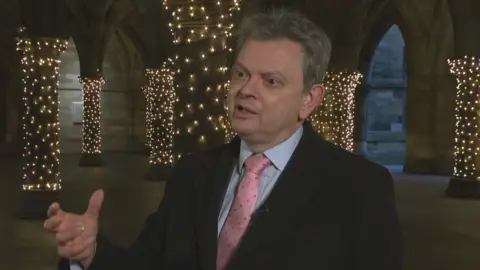
When Boris Johnson thinks as a journalist, tearing down regulatory intrusion into day-to-day life is his instinct also. But that's not where the public is, and when Boris Johnson thinks as prime minister, he seems wary of deregulation.
That is not only because it would increase friction in trade with Europe, but because many of the rules he used to criticise as a journalist have significant support within Britain - from food safety to job protection.
Says Sir Anton Muscatelli: "The big economic gains would have been if the UK had decided, say, to heavily de-regulate in agriculture, in terms of being able to import really cheap food. But that's not what our population wants. They want to maintain high environmental standards.
"I suspect that will be part of a post-post-Brexit debate. In five years time, once the political heat is taken out of discussion of Brexit, the political debate will settle down around the question of what kind of country we want to be, in terms of economic arrangements and trade.
"At the end of the day, The EU and UK are close geographically. They have to trade. The question is: is this where we should settle, or might we get closer without necessarily re-joining the EU?"
